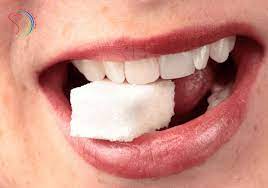Effects of Sugar intake
Every day, an average adult will consume about 24 teaspoons of added sugar in different beverages and foods every day. This means adding 384 calories of sugar per day. The safe daily intake of sugar is about 6 teaspoons (24 mg), about 100 calories for women, 9 teaspoons (36 mg) for men, and about 150 calories for men [1].
Natural sugar:
Sugar is naturally found in all carbohydrate-containing food groups, such as fruits, vegetables, grains, and dairy products. You can eat foods that contain natural sugars. These foods are slowly digested in your body, which means your body’s calorie supply is slow.
Add sugar:
It is a sugar added by food manufacturers to enhance the flavor and extend the shelf life of the product. We ingest these added sugars in the form of different products every day, such as candies, biscuits, chocolate, cereals, baked goods, beverages, as well as soup, ketchup, and bread.

Sugar intake has some effects on health:
Health problems can occur when you consume a lot of added sugars. High sugar intake increases insulin levels in the blood, which may cause inflammation of the arteries and heart walls. This can affect heart health and cause strokes, heart attacks, and heart failure.
High sugar intake will also increase your weight. Added sugars are digested faster than natural sugars, so they cannot satisfy your hunger for a long time. This may cause you to eat more and consume more calories throughout the day.
Due to weight gain and its adverse effects on the liver, artificial sweeteners and added sugars increase the risk of type 2 diabetes. If you get more calories from the calories your body needs than your body needs, you are more likely to be overweight and have type 2 diabetes.
When you eat sweets, the sugar gets stuck between your teeth. The bacteria that cause tooth decay like this sugar that is present in the teeth. They eat the sugar that sticks to the teeth and produce acid, which leads to tooth decay.

Eating a lot of sugar can also cause inflammation of the body, which can lead to joint pain and skin problems. It increases the risk of rheumatoid arthritis, and inflammation causes the skin to age faster. It also destroys protein fibers; collagen and elastin that keep the skin firm.
High sugar intake will produce high levels of fructose, which can damage the liver. Fructose is broken down in the liver to produce fat, which leads to a variety of liver diseases [2].
Some healthy ways to consume sugar:
Try to reduce the amount of sugar in baked goods by one-third or one-half.
Use fruits instead of sugar-added items. Try adding fruit instead of sugar to cereals or oatmeal.
Use extracts such as vanilla and almond extract instead of sugar
Pay attention to food labels and try to use products with less added sugar
Use fresh or canned fruits to satisfy your sweet tooth
Try to drink fresh fruit juices or smoothies without added sugar. You can also drink fresh juice instead of cold drinks and soda.
References:
1-Havard Health Publishing. (2019, November
5). The sweet danger of sugar. Retrieved November 4, 2021, from Havard
Health Publishing:
https://www.health.harvard.edu/heart-health/the-sweet-danger-of-sugar
2-Nazario, B. (2019, December 17). How Does Too Much Sugar Affect Your Body? Retrieved November 4, 2021, from WebMD: https://www.webmd.com/diabetes/features/how-sugar-affects-your-body




